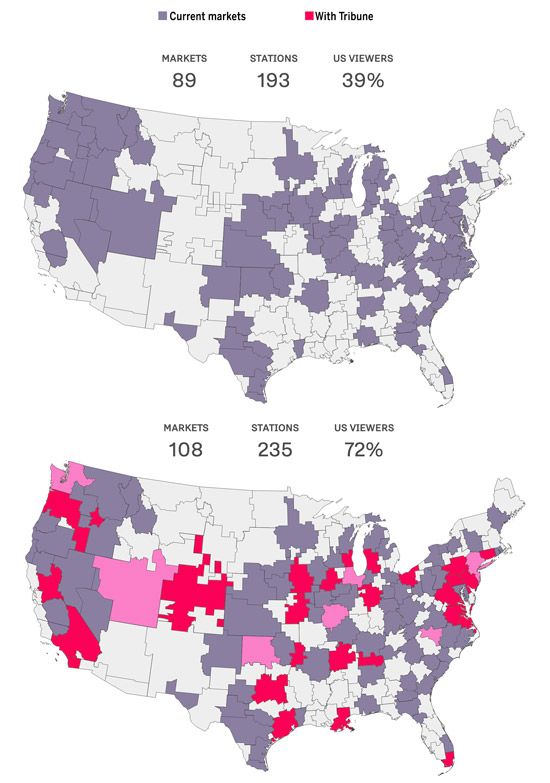TV Behemoth Raises Journalistic Concerns
COM’s John Carroll talks about Sinclair Broadcast Group

Watch the video of local Sinclair Broadcast Group newscasters around the country parroting the same script denouncing “false news” here. Courtesy of The Concourse
Call it the Stepford Anchors: dozens of talking heads on local newscasts around the country parroting the same script denouncing “false news.” Media observers found the message disturbing for three reasons:

It echoed President Trump’s mantra about fake news, raising concerns of partisan water-carrying. The anchors all were ordered to read the script by their employer, Sinclair Broadcast Group. And with 173 stations, Sinclair is the biggest owner of local TV in the country, and one that will get a lot bigger if regulators approve its proposed merger with Tribune Media, which owns dozens of stations.
In an age of distrust of the media, almost 85 percent of Americans say they do trust local TV news, the Pew Research Center found. The medium commands a larger audience than newspapers and cable and national network newscasts.
BU Today asked John Carroll, a College of Communication assistant professor of mass communication, to talk about the issue. The Emmy Award winner is a former news industry analyst at Boston’s WGBH-TV, current analyst for WBUR, the University’s National Public Radio station, and a media news blogger.
BU Today: What’s your take on Sinclair?
Carroll: There are a few concerns with Sinclair. They own and operate 173 stations, and they’re looking to buy Tribune Media. Donald Trump basically endorsed the deal. Traditionally, that’s the kind of deal that would get a lot of scrutiny from the Federal Communications Commission because of the consolidation. If it goes through, they’ll have 220 stations, and that’ll cover 70 percent of American households. Tribune would give them stations in major markets that they do not have now.
Sinclair is sympathetic and supportive of Donald Trump, who is getting behind a merger that usually would get a lot of scrutiny.
The left has been complaining about corporate media consolidation. Can Sinclair legitimately say, we’re not doing anything unusual?
They’re bumping up against a ceiling for the amount of coverage you can have for one company in terms of broadcast ownership. The FCC is essentially changing the rules now to allow for greater consolidation.
The other element is journalistic. They are dictating coverage and the editorial stances of these local stations that normally would be decentralized. The diversity of voices is starting to disappear. You can see in Des Moines a very similar newscast that you see in Boise, Idaho. There’s content that Sinclair is sending called “must-runs.” They are commentaries from Boris Epshteyn, who is an avid Trump supporter—avid enough that he got tossed off CNN because he was engaging in radical partisan hackery. Stations also have to do a daily update from the “terrorism alert desk,” which is political marketing in search of content. It’s not for the most part a daily issue.
Could Sinclair say it’s just another cog in this hyper-partisan media landscape?
Not everyone else is doing it. Fox News and MSNBC are doing it, but they’re national cable networks. With Sinclair, we’re talking about stations that have a connection to their community, and those stations, instead of being allowed to be local, are being nationalized. Instead of allowing local stations to customize content, Sinclair is making them centralize content, making them nationalize it.
Making them say the same thing is less important than interfering with a really important relationship between local TV stations and their communities. These are people that come into their living room every morning, or their kitchen every morning, who traditionally have a level of trust. Sinclair is mucking with something that is important. The shared experience is something that happens to a large degree on local TV newscasts, because those are things that people tend to watch in real time. I think that’s a significant loss.

Sinclair said that all its anchors said was, there’s a lot of false news out there, especially on social media. What’s wrong with that?
It’s disingenuous. If PBS says to all its member stations, go out and tell people what our standards are, that’s one thing. But go out and say what other people’s standards are, that’s what makes the difference.
This idea of we’re just warning them of Joe’sHouseofFacts.com doesn’t hold up. It’s clear that it plays into the whole campaign that the Trump administration has waged against the mainstream media. Everybody gets to choose their own reality right now. I think Sinclair may turn off part of the market, but we’ve got a country where half of the country is living in one information universe and half of the country is living in another. They’ll probably reinforce the bond with that half of the market.
What about antitrust, anti-monopoly regulation?
You can look at the structure of the station groups or their conglomerates. But for the government to step in and say, you can’t do this kind of thing, that would be completely misguided.
That would be controlling speech?
Exactly. You don’t want to invite the government into your house because once they get inside, they’re going to kick their shoes off and ask for a bologna sandwich. I don’t want anyone to think I would recommend that there be some kind of government regulation over these kinds of campaigns.
Then is this a problem without a solution?
That’s the way it’s going to go, but I think it’s to everyone’s disadvantage to see that kind of polarizing happen on the local television level.
Should Sinclair anchors, as journalists, resign in protest over the way that outfit is run?
Anchors should not be put in this position in the first place. There is a clause in all their contracts that says that if they leave before their contract is up, they have to give Sinclair 40 percent of their annual pay. They can’t afford to leave. There’s a financial penalty to leaving Sinclair that hasn’t gotten all that much attention, but it’s the thing that will keep a lot more than might stay otherwise.

Comments & Discussion
Boston University moderates comments to facilitate an informed, substantive, civil conversation. Abusive, profane, self-promotional, misleading, incoherent or off-topic comments will be rejected. Moderators are staffed during regular business hours (EST) and can only accept comments written in English. Statistics or facts must include a citation or a link to the citation.